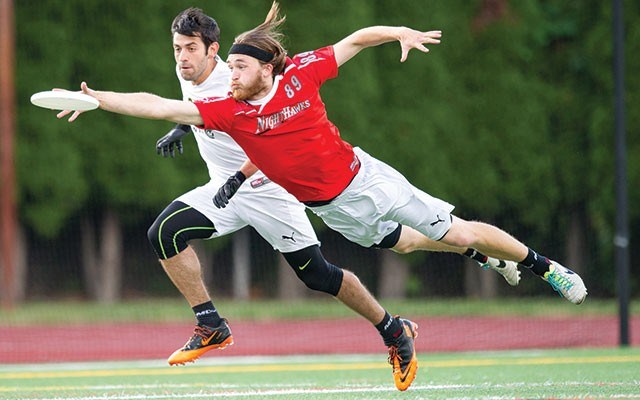I was out running in North Vancouver the other day when I encountered a strangely familiar odour. Burning leaves — a smell I had yet to encounter in my 16 years on the soggy West Coast, but one clearly lodged deep in the reptilian part of a brain that grew up in Toronto. The scent released a flood of fall memories, but the image I zeroed in on, perhaps because I was sprinting and there was sweat in my eyes, was of playing ultimate — you know, "that Frisbee game."
I played competitive ultimate for over 20 years, from recreational leagues to the Canadian National Team. Even won a world championship. I'd learned a lot, and, if reminded by a mere smell, had likely come away with some form of wisdom — which I'd always imagined to be a sense of fair play in competing both with and against someone.
I'd played at all times of year in all climates in all parts of the world but for some reason, in my mind, fall in the East was ultimate season. It was when the air changed and running got harder; it was also when the weather got wild — wind, rain, cold, snow — changing both field and flight in a sport now truly fitted to the elements. It was when my team would travel to big U.S. tournaments in college towns in upstate New York and New England. And it was when I first noticed that many mountain towns — ski towns — fielded great ultimate teams. When I moved west that didn't change. For many years Whistler had a great ultimate scene, and I travelled and played with new friends, facing hard-nosed, hard-running squads from Boulder, Tahoe, Bozeman, Salt Lake City, Canmore/Banff, Vernon, and Fernie; it seemed attitude came with altitude — not least because discs fly further in thinner air. Like a clique within a fraternity.
I'd seen the game played in many a mountain town — "seen" being the operative word since it seemed wise, due to the natural attrition of failing joints, to step away. But I felt those stirrings again during an Ultimate game I'd seen this summer at Quest University in Squamish.
It was around 9 p.m. on a hot July day, just after the sun slipped behind the mountains to the west and the air went cool like water, when the young people started arriving at the field. I sat on a picnic bench as they came in from different directions, some of the guys shirtless, girls all carefree and laughing. One group tossed a disc between them as they walked, continuing onto the field where they arranged themselves in a circle. Most of the guys were throwing over each others' heads on purpose so that the receiver would have to run after it. One barefoot girl was making trick throws — gripping the disc from the front and flipping it backward over her arm, then curling it under for a skeet-shooter-type delivery with a ton of torque. It was a freestyle throw I hadn't seen in years and I wondered where she'd learned it. It was nice to see some of the old tricks still survived. I watched for a few minutes, the disc arcing through the air from hand to hand, a magic plate passed between athlete gods. It's a calming thing to watch the flight of a flying disc. Meditative. Because they're at the whim of even the faintest zephyr and never do exactly the same thing twice, I could watch discs fly forever.
Soon, a professor walked up and joined the game, carefully doffing shoes and socks and dress shirt and putting on a T-shirt one of the other guys proffered. He looked keen and I could tell he was a serious player. Another guy saw me watching and called over "Hey — want to play?"
"Uh, I'm OK," I said reluctantly. "Thanks." I watched them arrange themselves on the field, seven against six, knowing that by taking up his offer I could have evened the numbers for a standard seven-on-seven game. As they started up and the running intensified, I was drawn to the pounding of feet across Astroturf. There were other sounds, too: the audible counting, the grunting of exertion, the groaning at missed throws and catches, the clapping for each other when good passes or goals were made. This was Ultimate. The game I loved. I wasn't sad but envious.
Every fibre of my being had wanted to play, and saying "no" in that moment was one of the hardest things I've ever done. But I knew myself, and, given the impossibility of taking it easy the probability of injury seemed virtually certain. So it was, for a change, enough to simply watch as the mountains turned pink in the gloaming, and remember those halcyon days of fall in the East — when the smell of burning leaves would not have seemed so foreign.
Maybe this was the true wisdom gifted by Ultimate — the courage to finally let it go.
Leslie Anthony is a Whistler-based author, editor, biologist and bon vivant who has never met a mountain he didn't like.




